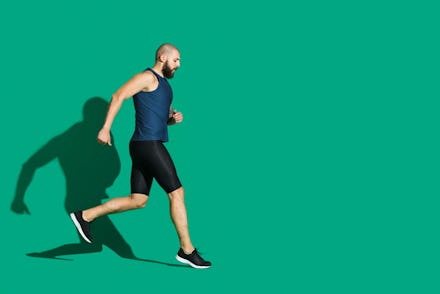Intuitive training is a much-needed antidote to "no pain, no gain"

February is where New Year’s resolutions go to die. A couple weeks ago, my gym was packed with folks I’ve never seen before doing HIIT workouts and obsessively checking whatever on their Fitbits. Now those same folks are nursing pulled hamstrings in the gym’s bar (I live in New Orleans). Burnout and injury are real impediments to getting into shape, but intuitive training is a new philosophy of fitness that aims to keep you fit without hurting yourself.
In some ways, intuitive exercising means exactly what it sounds like. “Intuitive training means implementing real-time adjustments to workouts based upon how your body feels,” says Kate Ligler, a San Francisco-based endurance coach and wellness specialist at Mindbody, an app that makes fitness classes accessible to consumers. In practical terms, that means checking in with how your body feels before and during a workout and planning your weights and reps accordingly instead of trying to stick to an arbitrary training plan or supposedly universal WOD. That’s the obvious part.
You know how intuitive drinking means you have to stay tuned in to your body so you can figure out how much to drink? Intuitive training requires that same kind of awareness. It’s mindful exercise.
The second aspect of intuitive exercising seems a little less, well, intuitive. “You have to take into consideration factors such as nutrition, overall body and movement health, sleep, and stress levels on a relatively unemotional level,” Ligler explains. That sounds like tracking. Isn’t data tracking sort of the opposite of intuitive? Not so much. Some folks who practice intuitive training track their sleep and energy patterns religiously so that they can make objective decisions about their intuitive workouts.
Intuitive exercise isn’t some new age fitness trend that involves you tapping in to the spirit world for advice about your bicep curls.
Intuitive training doesn’t mean having no routine. Instead, it means using a combination of subjective and objective data to make sound choices about your routine. This is a radical departure from the strict , “no pain, no gain,” regimens like CrossFit, TRX, and super intense classes that have been trending for the last few years.
Intuitive exercise, then, isn’t some new age fitness trend that involves you tapping in to the spirit world for advice about your bicep curls. It also doesn’t mean that your fitness will suffer. In fact, a lot of professional athletes use exactly this combination of objective data (tracking) and subjective data (tuning in to how they feel) to stay in peak form. “Technology can give you a lot of information about your preparedness,” Rondel King, an exercise physiologist at the NYU Langone Sports Performance Center, tells me. He says that a lot of athletes use something called the Omega Wave, which is a piece of technology that measures your body stats and gives you a “readiness” score.
“You can use subjective data,” King says, “But if you’re not feeling up for working out, having physiological data can help you figure out why.” When you take into consideration all the variables that go into that ephemeral thing we call “motivation,” having objective data about your sleep and hydration levels can take some of the shame out of the moments you feel less motivated. “There are some days that even if you’re not feeling it, you have to push through, and you can use the intuitive approach to guide you,” says King. “but it’s not an excuse to skip working out. It’s a guide to keep you on track, injury free and progressing.”
Intuitive training takes the pressure of “staying pumped.” You don’t have to get all aggro to work out. Instead, you can tune in to how you're feeling and use some objective measurements to make smarter choices. This reduces the chance of injury because there’s no need to “push through” if your body isn’t prepared and, perhaps more importantly, it takes the self-judgement out of not being able to “stick” to some intense trend-based plan that wasn’t made with your body in mind.
As someone who has worked in the fitness industry for decades, I say it’s about time. All I’ve ever gotten from “no pain, no gain,” is shame and unnecessary wear and tear on my body and spirit.